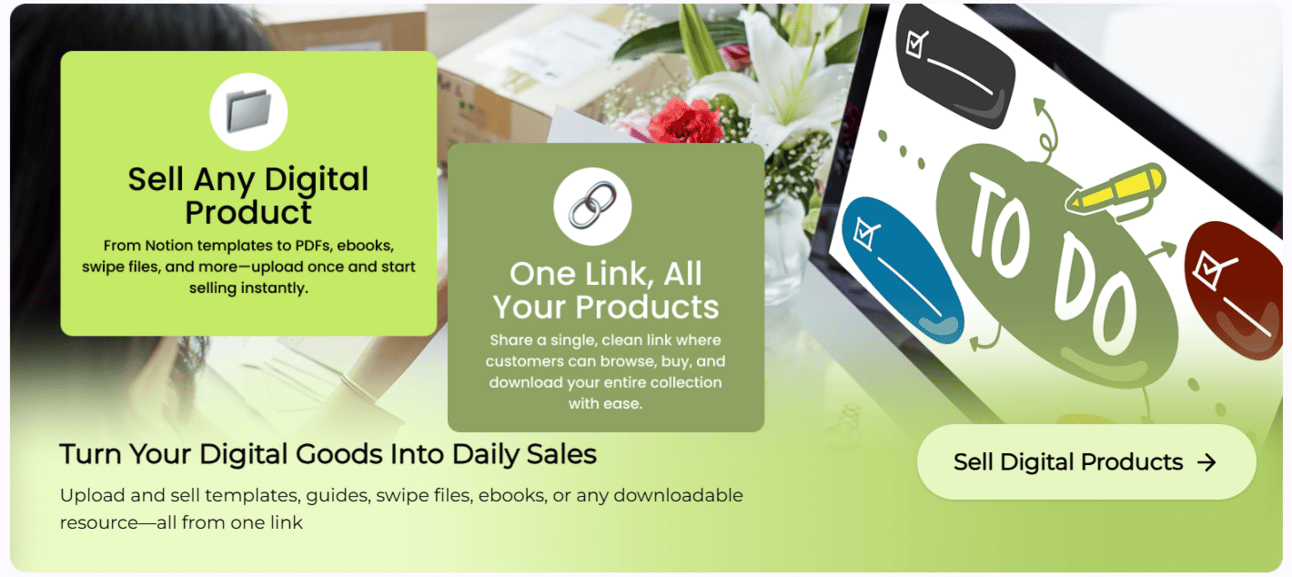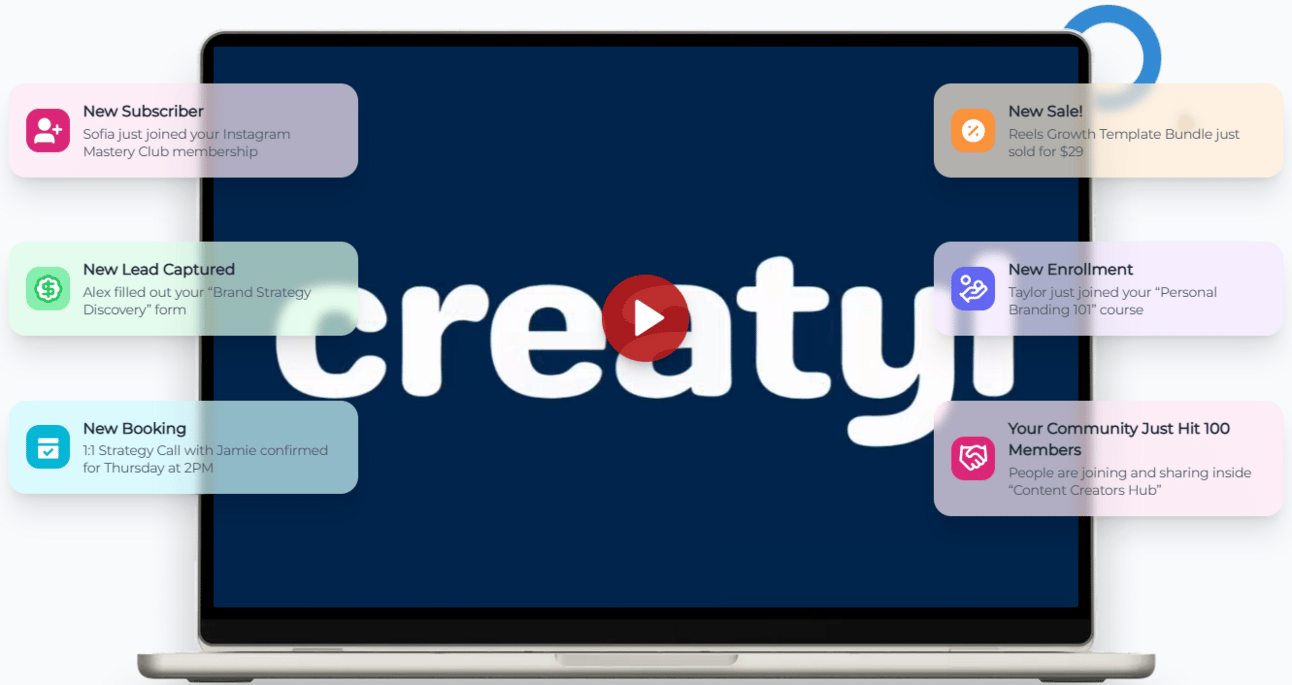Hey Full Potential Zoners,
That’s right: I'm running a free 30-day challenge that shows you how to build, launch, and sell your own offer—from scratch.
Digital product. Course. Community. Doesn't matter.
You’ll create it. You’ll sell it. You’ll get paid.
This is free, live with me, hands-on, and nothing is left out. I’ll guide you, step by step for 30 days.
Let’s continue…
Leadership without empathy— is just control.
Empathy is not about being soft.
It’s about being strong enough to care.
First, please check out the incredible opportunity from today’s sponsor. 👇
What if your “free” advice earned you money over and over?
Just one clear offer someone can buy right after they say:
“You made that so simple.”
“I’ve been looking for this forever.”
“I wish I could just hire you for this part.”
That’s what creatyl helps you do.
✅ Turn what you’re already saying into something you can sell
✅ Skip the tech stack—everything’s in one place
✅ Get paid for what people already ask you for
BONUS: For the next 5 people who enroll in an active plan - I will personally help setup your creatyl store and first offer.
Small moments of care build unstoppable trust.
Because empathy first isn’t just better leadership— it’s the only leadership that lasts.
Today we are going to help leaders master this by using:
‘Empathy First - How To Show Empathy as a Leader'.
Let’s dive in!


Download This PDF + my Top 60+ Cheat Sheets At Bottom of Email
4 Everyday Ways to Lead With Empathy
1. The Quiet Teammate
Scenario: You notice someone in your team meetings hasn’t said much lately and seems distracted.
Presence + Perspective
Pause your tasks, step away from screens, and talk to them privately—without rushing.
What to say:
“I’ve noticed you’ve been a little quiet—just wanted to check in. Is anything on your mind?”
Then follow up with:
“I might not fully get what you’re dealing with, but I’d really like to understand.”
You’re showing up fully and opening the door for them to share their side without pressure.
Even a short, private chat builds connection fast.
2. The Struggling Intern
Scenario: A new team member misses a deadline, and you're annoyed—but you also know they’re still learning.
Clarity + Compassion
Instead of reacting with blame, offer truth and support together.
What to say:
“Let’s walk through what didn’t work here. I’ll be honest: this needs to improve, but I’m here to help you get there.”
Ask:
“What part of this task felt unclear or overwhelming?”
People can handle tough feedback when they know you care and you're in it with them.
Leading with both heart and honesty earns respect.
3. The Personal Crisis
Scenario: Your teammate is dealing with a family emergency but keeps trying to work like everything's fine.
Compassion + Consistency
Don't wait for them to ask for space.
Offer it first—and treat their situation with the same care you'd give anyone else.
What to say:
“You’ve got a lot going on. It’s okay to pause—do you want to shift anything off your plate this week?”
And if others have received support before, say:
“Just like we did for [someone else], we’ll cover what’s needed so you can take care of what matters most.”
People remember when you step up without being asked—and when you treat everyone with the same steady care.
4. The Mistake Everyone Saw
Scenario: A team member makes a public mistake that slows a project down. Tensions are high.
Clarity + Presence + Consistency
Don’t ignore it.
Address it with calm, eye-to-eye honesty, and make sure you’re as fair as you’ve been with others.
What to say:
“I want to be real with you—this threw us off track. But I’ve seen others make similar mistakes too, and we worked through it. We’ll do the same here.”
Then ask:
“What would help you avoid this next time? Let’s build that in now.”
You’re holding the line while still showing up human.
This is what real leadership looks like—steady, fair, and clear.

Ask this instead: What do I always repeat?
Most people look for new ideas when they’re sitting on useful repetition.
If you’ve ever said:
“Let me explain that again…”
“Here’s what I usually say when someone’s stuck…”
“This is what finally made it click for them…”
Then you’re not short on content.
You’re short on a container.
Try this today:
Catch yourself repeating something—in a meeting, email, or DM.
Copy/paste that into a note. No overthinking.
Ask: “Could this be a 1-page guide, voice memo, or script?”
If yes, you’ve got a sellable micro-offer.
That’s where creatyl comes in.
When you’re ready to turn that repeated answer into something you can send, sell, or share—it gives you the structure. And it only takes a few minutes.

Here's how you can make it real today:
Step 1: Pick Your Focus
Choose one empathy skill you want to improve today.
Think about where you tend to fall short.
Write it like this:
“Today, I want to lead with more [presence, compassion, perspective, clarity, or consistency].”
Step 2: Spot Your Window
Look ahead at your day.
Where might empathy actually be needed?
Find one real moment. Nothing fancy.
A meeting, a check-in, a reply to a vague message.
Write it down if it helps.
Step 3: Plan One Move Ahead
Before that moment, ask:
“What’s one small thing I can do that shows empathy?”
Pick one:
Ask a better question
Give your full attention
Say something with care
Slow down before you respond
That’s your move today.
Step 4: Watch What Happens
After the moment, ask:
Did the other person open up more?
Did you respond with more calm or care?
Did it change how the moment felt?
Write down one sentence about what you noticed.
Step 5: Lock It In
At the end of the day, say:
“Today, I showed empathy by ______ and this happened: ______.”
If you’re up for it, add:
“Tomorrow, I’ll try again with ______.”
AI Prompt: “Act as a leadership coach. Help me prepare for a real-life moment where I want to show more empathy today.
Here’s what I’m working on:
Empathy Skill: [Insert skill, e.g., "Being more present during conversations"]
Type of Interaction: [Insert context, e.g., "1-on-1 meeting with my direct report"]
Who I'm Speaking With: [Insert name or role, e.g., "Sofia, a team member who’s been quiet lately"]
Timing: [Insert when this will happen, e.g., "This afternoon during our check-in"]
Help me with:
A simple action I can take that will show empathy in this situation
A few examples of thoughtful, clear questions I could ask
One thing I should avoid doing that would break connection
A sentence I can say to close the conversation with care and clarity
Keep everything short and natural. I want this to feel real, not scripted.
Use casual, honest language I’d actually say at work.”

Empathy isn’t a soft skill. It’s a leadership skill.
People don’t remember your plans—they remember how you made them feel.
Trust is built when people feel seen, not managed.
The best leaders slow down long enough to listen fully.
Every moment you choose empathy, you build something that lasts.
Until next time and with lots of love,
Justin

This Week’s Growth Recommendations
Book To Read:
“Nonviolent Communication: A Language of Life” by Marshall B. Rosenberg (see it here)
TED Talk to Watch:
“Everyday Leadership" by Drew Dudley (see it here)
Guide to Download:
“Create Once. Earn Forever.” My personal step-by-step plan on how I earn money as a creator and how you can too (see it here)

I created an online version of my live cohort at a 94% lower cost!
🏆 Everything the live cohort has - just do it at your own pace
✔ 550+ Prompts for ANY Work/Life Situation
✔ Learn to Master ChatGPT, Gemini, Claude, Grok, Copilot
✔ Results You’ll See Fast
✔ Yours for Life - Learn on Your Schedule
✔ Clear, Step-by-Step Execution
✔ No Confusion, No Guesswork
✔ No Tech Skills? No Problem.
✔ Save Hours, Cut Costs, Work Smarter
✅ AND SO MUCH MORE
👉 Every day without AI in your leadership is a missed opportunity.
👉 Check out the course I made that teaches ANYONE to be a design expert!
✅ Step-by-step modules to master:
✔️Infographics that stand out in the feed
✔️Cheat sheets that simplify complex ideas
✔️Carousels that drive massive engagement
✔️Quote images that get shared
✔️Lead magnets that attract the right audience & MUCH MORE
✅ PLUS 220+ Done-for-You Templates – Customize them in minutes and make them your own.
📑 Today’s PDF
Download today’s PDF by Clicking Here
📑 Justin’s Top 60+ Cheat Sheets
Download All 60+ PDFs by Clicking Here
Were you forwarded this email? Subscribe and get my free eBook Click Here
Want to Sponsor this newsletter or a LinkedIn post? Click Here






